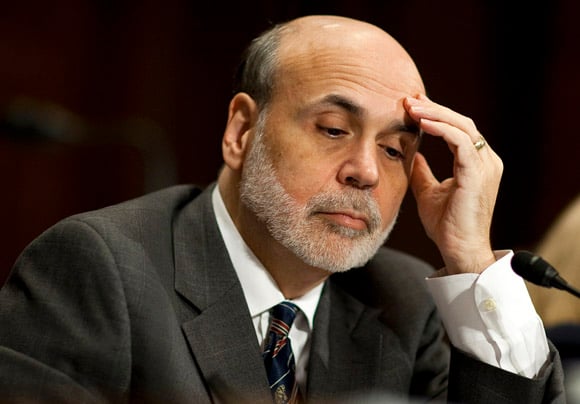QE3 not likely to be launched until January — if at all; waiting for the numbers
In the lead-up to Friday's Federal Reserve Board meeting in Jackson Hole, Wyo., the burning question is whether Fed Chairman Ben S. Bernanke will lean toward a third round of quantitative easing to help jump-start the U.S. economy.
While the S&P 500 is up about 12% this year, much of that rally can be attributed to the old adage that no news is good news, according to Kate Warne, investment strategist with Edward Jones.
“It's a lack of surprises that has led to better stock performance and lower volatility this year,” she said. “But if we don't see the Fed take any action to support economic growth, we could see a market pullback.”
Ms. Warne, who put the chances of a third round of quantitative easing at 50%, noted that the Fed might want to wait until January, when the full impact of the fiscal cliff will be clearer.
“I think the Fed would rather wait until after the fact,” she said of the confluence of year-end deadlines that will combine higher tax rates, reduced unemployment benefits, spending cuts, the end of the payroll tax cut and the imposition of new taxes to help pay for the new health care law.
Economists estimate that if Congress does nothing about the various fiscal cliff factors, there will be a drag on the U.S. economy of more than 3%. Currently, the economy is growing at less than 2%.
Earlier this week, Russell Investments updated its 2012 Global Outlook report to show that it expects the Fed to respond to weaker U.S. employment and economic growth with another round of quantitative easing.
According to the report, QE3 could start later this year. Russell doesn't expect the stock market to gain much this year beyond the August highs.
Most Fed watchers, however, are not ready to make such bold predictions with regard to quantitative easing.
“Bernanke will not make a dramatic announcement at Jackson Hole or hint at a major new initiative like quantitative easing as he did in 2010,” said American Enterprise Institute economist John Makin.
He does expect Mr. Bernanke to suggest a commitment to holding interest rates down, perhaps until 2015, extending the previous commitment to keep rates low until mid-2014.
Kevin Mahn, president and chief executive of Hennion & Walsh Asset Management, doesn't think the Fed will make a move toward QE3 until after there is more information on the strength of third-quarter earnings season.
“We won't know about third-quarter earnings until at least October, but we do know that consumer confidence is waning and businesses are still sitting on cash,” he said. “If weaker third-quarter earnings led to slower annualized economic growth, that could lead to QE3.”







